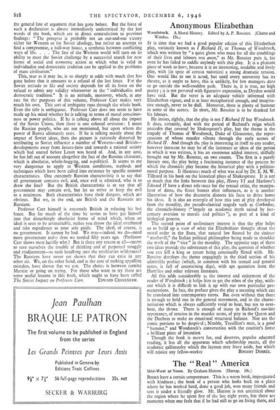Anonymous Elizabethan
Woodstock. A Moral History. Edited by A. P. Rossiter. (Chatto and Windus. I5s.)
IT is time that we had a good popular edition of this Elizabethan play, variously known as I Richard II, or Thomas of Woodstock, which was written by "a quiet ghost who must for all the troublings of their lives and labours rest anon," as Mr. Rossiter puts it, for even he has failed to saddle anybody with this play. It is a pleasant piece of work to have, because it is an interesting, readable and lively play, with (in spite of certain naiveties) a strong dramatic tension. One would like to see it acted, but until every university has its theatre, as it ought to have, this is unlikely, for few managers dare to go outside the well-trodden path. There is, it is true, no high poetry ; it is not pestered with figurative expression, as Dryden would have said. But the verse is an adequate vehicle informed with Elizabethan vigour, and is at least metaphorical enough, and imagina- tive enough, never to be dull. Moreover, there is plenty of humour in some of the scenes. In short, Mr. Rossiter is to be thanked for his labours.
He insists, rightly, that the play is not I Richard II but Woodstock. It does, certainly, deal with the period of Richard's reign which precedes that covered by Shakespeare's play, but the theme is the tragedy of Thomas of Woodstock, Duke of Gloucester, the reper- cussions of whose murder vibrate through the early scenes of Richard II. And though the play is interesting in itself to any reader, however innocent he may be of the literature or ideas of the period in which it was written, it has an enormous added interest, skilfully brought out by Mr. Rossiter, on two counts. The first is a purely literary one the play being a fascinating instance of the process by which the Chronicle play became the historical play with a politico- moral purpose. It illustrates much of what was said by Dr. E. M. W. Tillyard in his book on the historical plays of Shakespeare. It is not so much that the links between this play, Henry VI and Isarlowe's Edward II have a direct relevance for the textual critic, the manipu- lator of dates, the fierce hunter after influences, as it is another illustration of how the dramatist distorts his facts to drive home his ideas. It is also an example of how tnis sort of play developed from the morality, the pseudo-classical tragedy such as Gorboduc, the chronicle-history (" largely an academic myth raised by last- century aversion to morals and politics "), as part of a kind of biological process.
The second point of preliminary interest is that the play helps us to build up a view of what the Elizabethans thought about the moral order in the State, that natural law flouted by the sinister " machavill," the Italian political philosopher being made to shoulder the work of the " vice " in the morality. The opposite tugs of these two ideas provide the substratum of this play, the question of whether you can kill a king or tyrant being continually flirted with. Mr. Rossiter develops the theme engagingly in the third section of his admirable preface (which, in common with his textual and general notes, is full of entertaining digs), with apt quotation from the Homilies and other relevant literature.
All this adds considerably to the interest and enjoyment of the reader of Woodstock ; it helps him to get the ethos of the play, with- out which it is difficult to link it up with our own particular pre- occupations. In fact, the preface gives the play a meaning which can be translated into contemporary terms. But even without that there is enough to hold one in the general movement, and in the charac- terisation which is always sufficiently vivid to bear, but not to over- bear, the theme. There is enough of irony in Richard's too-late repentance, of tension in the murder scene, of pity in the Queen and the Duchess to make an emotional structural balance. Nor are the comic portions to be despised ; Nimble, Tresillian's man, is a good "humour," and Woodstock's conversation with the courtier's horse cl brilliant piece of invention
Though the book is meant for, and deserves, popular educated reading, it has all the apparatus which scholarship exacts, all the academic gallimaufry which the laymen may leave aside, but which


































 Previous page
Previous page